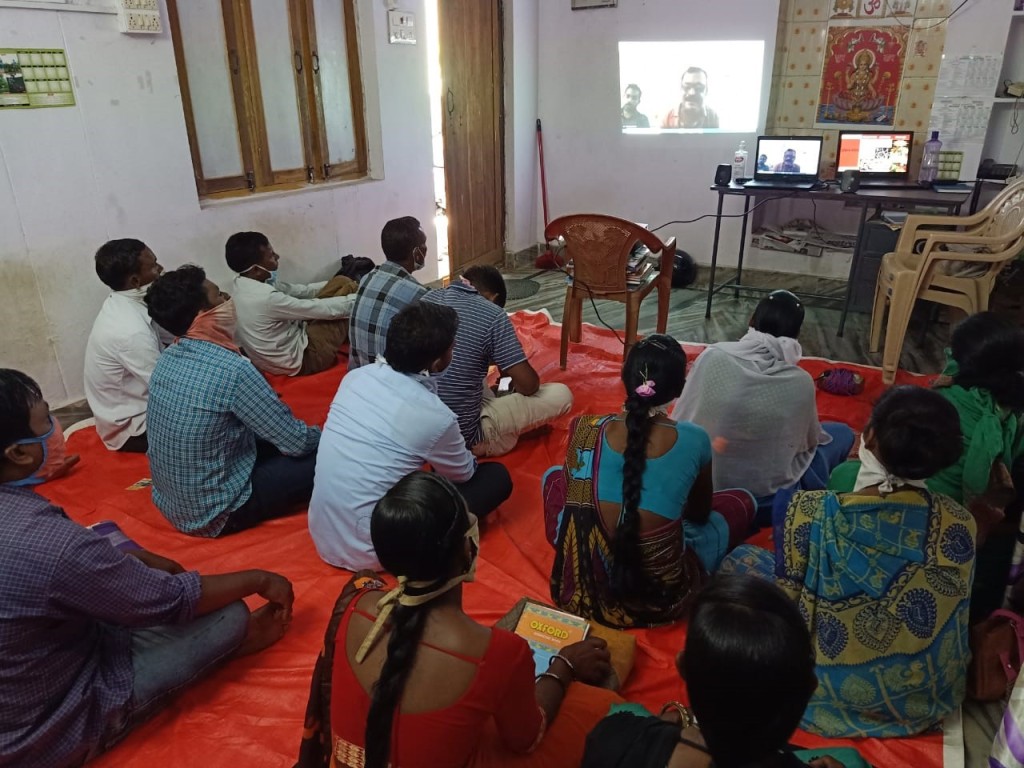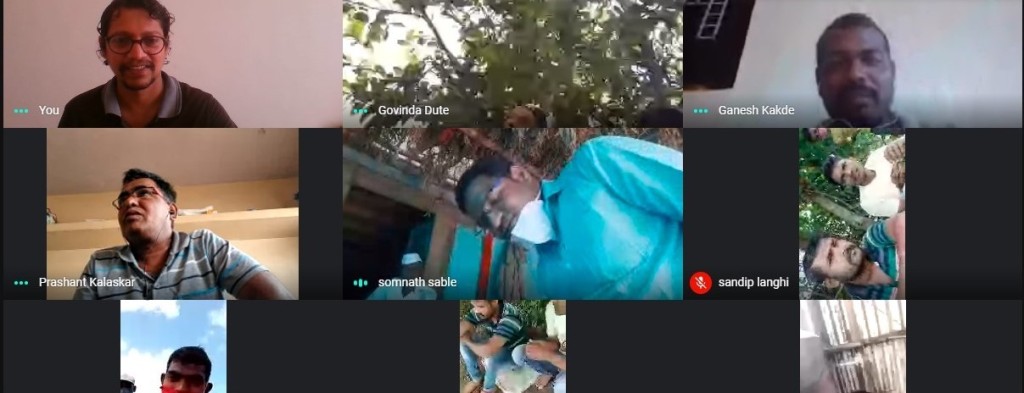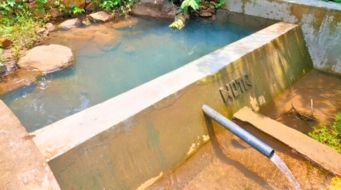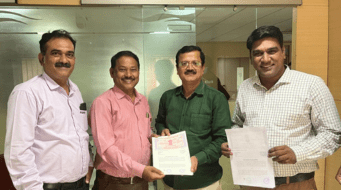by Harshal Khade

In the month of September, WOTR has organised a second series of online workshops in Maharashtra, Telangana, Madhya Pradesh, Rajasthan, Jharkhand, Odisha and Chhattisgarh to know the how people are dealing with the challenges posed by the COVID-19 pandemic and to discuss how to address the pandemic effectively.
This series was organised as a follow-up to the first series organised in May 2020. WOTR organised 14 virtual workshops in its seven project states and provided crucial tips on how to deal with COVID-19, returning migrants, and the importance of keeping the villages in the COVID-19 Green Zone (Areas with zero confirmed cases or no confirmed case in the last 21 days).
In the second series, Over 1,900 participants from 418 villages of the seven states came together for 26 online interactive workshops to talk about the situation due to the COVID-19 pandemic and express their concerns for the present and the future. This series was a follow up of workshop series organised in May. This series also tried to find out how villagers are trying to cope with the current situation and what the measure taking to keep their villages COVID-19 free.
56 sarpanchs, 269 gram panchayat members (23 males and 146 females), 378 Village Development Committee (VDC) members (293 males and 85 females), 318 SHG members, 149 health committee members (119 males and 30 females), 164 Wasundhara sevaks and 171 Wasundhara sevikas/Mahila pravartaks, 85 anganwadi workers, 107 ASHA workers, 28 government representatives, 100 other active villagers and 117 WOTR employees were part of the virtual sessions.
The following are key observations and points discussed during these workshops.
Maharashtra
In Maharashtra, more than 1100 participants from various districts attended the workshops — from the blocks of Sangamner, Gangapur, Ambajogai, Karjat, Khalapur, Shrigonda, Bhiwandi, Jafrabad, Ambad, Khultabad, Bhoom, Paranda, Pathardi, Parner and Bhokardan.

The situation during the current unlock and the challenges faced by villagers during these workshops are as follows:
- Villagers are maintaining meticulous records of the people coming back to villages and going back.
- Awareness on use of mask, hygiene and physical distancing seen in almost all villages.
- Villagers are using technology to connect with others. An anganwadi worker – Shila from Gangapur block started using technology and shared video on anganwadi classes through social media when physical meetings were not possible.
- SHG meetings resumed again after the hiatus of few months due to lockdown. SHG members are following norms of physical distancing and they have started bank transactions again as well.
- Some SHGs have started preparing and selling organic formulations.
- SHG members express the urgent need of new entrepreneurial opportunities in villages.
- Daily wage labourers with no source of income are looking for work opportunities.
- Dr. Tushar has guided participants on the correct use of mask, urged them to consult doctor in case of constant cold, fever and cough and asked to take proper nutritious healthy diet and sufficient sleep.
- The need for the ‘work for all’ and better coordination with various government departments.
- Mulitlayer kitchen garden are encouraged as a source of fresh vegetables for households and opportunity to earn by selling the surplus.
- Stitching facemasks has become one of the income generating activities by SHGs.
- Food demos are organised to create awareness on the importance of consuming a healthy and balanced diet.
- Gayatri Sutar from Wadgaon village, Ahmednagar spokeabout her and her husband’s battle against COVID-19 and how one could be recovered if doctor’s prescriptions were followed diligently
- People are adopting to the new situation where use of mask and personal hygiene has become a routine. The unnecessary outing of people have also come down in last few months.
- In Ambad COVID-19 has spread in three project villages. Villagers are handling the situation confidently.
- In Khultabad a family was detected COVID-19 positive and their cauliflower crop wasted as no one wanted to harvest the crop due to fear of contacting the virus.
- Villagers have become more receptive to the fact that many villagers are getting positive which is in contrast at the time of the lockdown during April due to efforts of WOTR and the government agencies.
- Watershed development work has started in many villages but the demand for work exceeds greatly the available work.
Madhya Pradesh
In Madhya Pradesh, WOTR conducted five workshops in Chhindwara, Mandla, Anuppur, Damoh and Seoni.
Important points discussed during these five sessions are as follows:
- Villagers complained of unavailability of jobs and their inability to buy food had left them with no option other than migrating again during the unlock period.
- In many villages, Anganwadi and health centre in the village area are still not functioning.
- Outsiders coming to village were asked to be quarantined in their homes or in other government buildings in the village.
- In Tevni village in Seoni, seven migrants were kept in Anganwadi and food was prepared and provided to them by the Grampanchayat.
- In some villages, MGNREGA work is available only for a person per family, so the income is limited.
- WOTR staff are empowering villagers and training them on regular basis. Sewing machines have been provided in villages of Anuppur, Mandla, Damoh, Chhindwara.
- Villagers need agriculture training to improve their agricultural yield.
- Maintaining hygiene has become a part of daily routine. They wash their hands and clothes every time after returning home from outside.
- Villagers with any symptoms of COVID-19, are taken to the nearest COVID-19 test centre or the GP calls the toll free number provided by government for the further action.
- Villagers are advised to feed their kids and pregnant women with protein powder to boost their immunity. They are also asked to consume green vegetables and healthy diet.
- Villagers are encouraged to develop kitchen garden for building nutrition security at home and to sell surplus vegetables in weekly market to earn additional income.

Odisha
In Odisha, WOTR conducted two workshops in Rayagada and Ganjam.
Important points discussed during these two sessions are as follows:
- The regular use of facemasks, maintenance of physical distancing and personal hygiene can be seen.
- ASHA worker Tarbani Sabar said, “We conducted awareness programmes with the support of WOTR’s Wasundhara Sevak and Sevika on the use of masks and maintaining physical distancing.”
- Migrants have started going back to cities after not being able to find work.
- Prakash Sabar VDC Secretary, shared that people were prone to get infected by COVID-19 virus at the huge gatherings such as water bodies, PDS shop, gram sabha etc.
- Trinath Sabar of Kadasi village shared the practical difficulty in wearing masks by saying that people were finding it difficult to wear masks while working and at times feeling suffocated.
- Villagers appreciated these workshops organised by WOTR and took up the responsibility to keep their village green and healthy even after the pandemic.

Jharkhand
In Jharkhand, 72 people from 25 villages participated in the workshop.
Key points discussed are:
- The prevailing status and spread of COVID-19 in the villages.
- ‘How best can people protect themselves from the virus?’ was the question central to the discussion.
- The facilities and aid extended by the government for the community.
- Other major difficulties faced by farmers – such as inability of farmers to sell their agricultural produce in the market

Chhattisgarh
In the workshop conducted, the following points were raised and discussed
Key points discussed are:
- Watershed work in the form of farm bunding were carried out under WOTR’s project as well as under MGNREGA with strict monitoring and regulation by Gram Panchaya.
- WOTR team under COVID-19 Relief Programme and Gram Panchayat provided essential kits and ration kits to the BPL families in Gaurang village.
- Villagers are particular about maintaining personal hygiene and try to include nutritious diet. Women are encouraged to produce vegetables at household level and also to prepare protein supplement powder.
- Other major difficulties faced by farmers – such as inability of farmers to sell their agricultural produce in the market
Rajasthan

In Rajasthan, the following are the important points discussed.
- Villagers are taking precautions of COVID-19 and no patient of COVID-19 has been detected yet in the project villages in Rajasthan.
- The construction of Pokhar (an earthen dam) and Pagara (a water retention wall) structures by WOTR and MGNREGA work provided employment opportunities during lockdown.
The exercise of interacting with villagers in the current COVID-19 pandemic this project has provided a number of insights into the work that needs to be done. People, though unsure about the long term impacts of the COVID-19 on their lives, have accepted the new way of life and try to maintain hygiene at household as well as village level. A lot to be done that will help them secure sustainable livelihoods in their own villages. At present many of returned migrant workers have returned again to cities for work or they would do so in the near future. WOTR through these workshops tried to reiterate the message ‘Your Safety is in Your Hands’ and WOTR would continue reaching out to these communities and to help them address the situation as best they can.





